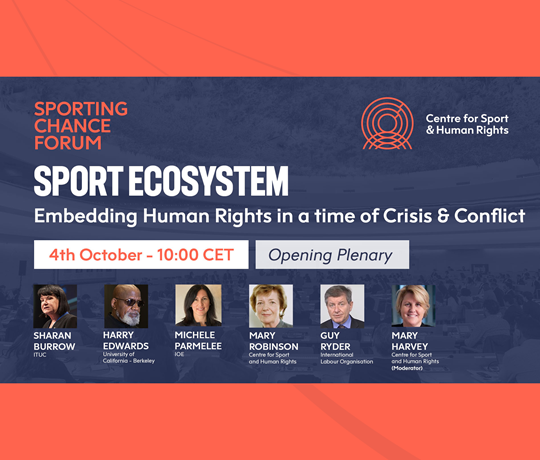Sport Ecosystem - Embedding Human Rights in a Time of Crisis and Conflict
Session Summary
The Sporting Chance Forum 2021 began by remembering and recognising the contribution to the field of sport and human rights of the late John Ruggie, who died in September 2021. Ruggie was the architect of the UN Guiding Principles on Business and Human Rights, and in 2015 played a seminal role in the emerging sport and human rights movement when he and Mary Robinson wrote to FIFA raising the question of what responsibility meant in the context of sport. John Ruggie’s ground-breaking report for FIFA, “For the Game. For the World”, and his uncontested legacy in creating the UN Guiding Principles framework that underpins the Sporting Chance Principles, has helped shape and galvanise the current sport and human rights agenda.
There is now growing recognition both within and beyond the world of sport that adherence to international human rights and labour standards, particularly through robust due diligence measures set out in the UN Guiding Principles, is essential for nurturing positive social impact. Sports institutions and traditional models, however, cannot deliver change alone. Governments, corporations, civil society organisations and others have obligations and critical roles to play to enable the emerging world of responsible sport to grow and thrive.
The importance of safety protocols within the world of sport has been highlighted by COVID-19, placing a spotlight on the need for appropriate due diligence to enable large sports events to resume. Multilateral institutions such as the International Labour Organization (ILO), and the Office for the High Commissioner for Human Rights have the authority to set standards, particularly for workers in the industry. The ILO’s “Global Call to Action”, for example, offered a plan for inclusive and sustainable recovery from COVID-19, with the intention of also building resilience against future challenges. Meanwhile, the International Trade Union Confederation has drawn attention to the need for protection against corruption, discrimination and exploitation.
"The playing field is a place to be seen, but it is also a platform,
a place to be heard."
- Dr Harry Edwards
Athletes play a vital role as leaders in the world of sport and human rights. Many athletes have shown commitment to critical causes, risking their careers for raising the voices or demonstrating for what they believe in. Being leaders in sport means engaging powerful individuals and institutions and working together with others to get all relevant stakeholders around the table, especially those whose rights have been abused. Their lived experience cannot be ignored or underestimated.
Sponsors should work with athletes and others in sport to advance the common good. Sponsors have a responsibility to create safe spaces for athletes, ensuring that their voice and agency are protected at all times. In the past, sponsoring a team or event was more about stamping a name on athletes clothing for greater visibility. In this new era, we are seeing a move toward cultivating more meaningful, sustainable partnerships that are underpinned by a sense of purpose and which have the strength to endure.
There are a wide range of issues that athletes feel passionately about. These require clear messaging and strong alliances to create effective advocacy. Social media has become a tool for today’s generation of athletes, and this has had great influence on the trajectory and impact of athlete activism. Today’s athletes can use their social media platforms to mobilise in support of human values and people.
Sport should celebrate the best of humanity, and ensure that fundamental human and work-related rights are fully embedded in the Sports Ecosystem.
Watch the full session here
Click here to watch the SCF21 sessions on demand on YouTube